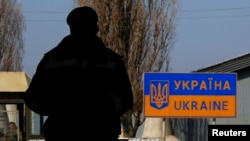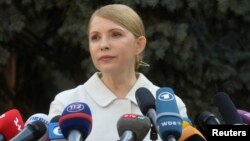WASHINGTON DC —
U.S. and European security agencies estimate Russia has deployed military and militia units totaling more than 30,000 people along its border with eastern Ukraine, according to U.S. and European sources familiar with the developments.
The current estimates represent what officials on both sides of the Atlantic describe as a continuing influx of Russian forces along the Ukraine frontier, the sources said.
Quoting two unnamed Obama administration officials, CNN has reported that, according to a U.S. assessment of the situation, the likelihood of a Russian incursion into eastern parts of Ukraine is now greater than it has been before.
The officials have been quoted as having seen several worrying signs in the past three to four days.
An incursion into eastern Ukraine, if deep enough, could enable Russia to establish a land connection to Crimea, which in a move widely condemned in the West it formally annexed last week. Currently, Russia has access to the Black Sea peninsula only by air and sea.
U.S. Congress to vote on Ukraine bill
In coming hours, both houses of the U.S. Congress are expected to approve financial aid for Ukraine and sanctions against Russia for its annexation of Crimea.
Senate Majority Leader Harry Reid said that the bill “sanctions and further isolates [Russian President Vladimir] Putin and his inner circle.” He called the measure “just the beginning.”
Calling for a quick approval of the bill, Senator Robert Menendez said that as “the world is watching,… the world's superpower cannot be seen as incapable of rising to Russia's challenge.”
The bill provides $1 billion in loan guarantees to Ukraine and sanction Putin's inner circle. It also calls for additional defense equipment and military training to countries in central and eastern Europe, including Ukraine, although assistance levels are still being debated.
Some senators, including Lindsey Graham, even call for Ukraine to be supplied with defensive weapons.
“To me, the answer is yes, because if you want to make Putin think twice about what he does next, he has got to pay a price greater than he has for Crimea," said Graham.
Tymoshenko launches presidential bid
Ukrainian former prime minister Yulia Tymoshenko, released from jail last month after her arch-foe Viktor Yanukovych fled from power, announced on Thursday she would run again for president in an election slated for May 25.
Tymoshenko, 53, a powerful speaker known for a trademark hair-braid, served twice as prime minister and ran for president in 2010, only to be narrowly defeated in a run-off vote by Yanukovych.
Yanukovych subsequently launched a campaign against Tymoshenko and her allies and she was jailed in 2011 for abuse of office linked to a gas deal she brokered with Russia in 2009.
She served two years of a seven-year term, mainly under prison guard in a hospital in Kharkiv, before being released when Yanukovych fled on February 20 and was subsequently ousted by parliament.
IMF pledges loans to Ukraine
The International Monetary Fund has pledged to provide Ukraine with up to $18 billion in loans.
But the country must enact tough economic reforms in exchange.
The IMF says the $14 to $18 billion it will provide will combine with contributions from the international community to total up to $27 billion in total assistance in the next two years.
Without the IMF-mandated austerity measures, Ukrainian Prime Minister Arseniy Yatsenyuk told parliament Thursday Ukraine's economy could contract by 10 percent this year. He said the country is on the brink of "economic and financial bankruptcy."
The IMF statement Thursday says Ukraine's recent economic policies have dramatically slowed growth and brought foreign currency reserves to a "critically low level."
The IMF's required reforms for Ukraine include a flexible exchange rate, higher energy prices for consumers and a restructuring of Ukrainian energy giant Naftogaz.
The reforms will hit the population hard, which could affect support for the interim government.
The new Ukrainian authorities took over after weeks of anti-government protests in Kyiv that forced then-president Viktor Yanukovych to flee the country last month. The protests began after Yanukovych backed off from signing a trade agreement with the European Union in favor of closer ties with Russia.
The toppling of Yanukovych was followed by Russia's incursion into and annexation of Ukraine's Crimea - a move condemned by the U.S. and the European Union as a violation of international law.
A World Bank bank report Wednesday said if Moscow's standoff with the West over Crimea intensifies, the Russian economy could shrink nearly two percent in 2014. The report predicts investors could pull $150 billion out of the country.
Some information for this report was provided by VOA's Michael Bowman, as well as AP, AFP and Reuters.
The current estimates represent what officials on both sides of the Atlantic describe as a continuing influx of Russian forces along the Ukraine frontier, the sources said.
Quoting two unnamed Obama administration officials, CNN has reported that, according to a U.S. assessment of the situation, the likelihood of a Russian incursion into eastern parts of Ukraine is now greater than it has been before.
The officials have been quoted as having seen several worrying signs in the past three to four days.
An incursion into eastern Ukraine, if deep enough, could enable Russia to establish a land connection to Crimea, which in a move widely condemned in the West it formally annexed last week. Currently, Russia has access to the Black Sea peninsula only by air and sea.
U.S. Congress to vote on Ukraine bill
In coming hours, both houses of the U.S. Congress are expected to approve financial aid for Ukraine and sanctions against Russia for its annexation of Crimea.
Senate Majority Leader Harry Reid said that the bill “sanctions and further isolates [Russian President Vladimir] Putin and his inner circle.” He called the measure “just the beginning.”
Calling for a quick approval of the bill, Senator Robert Menendez said that as “the world is watching,… the world's superpower cannot be seen as incapable of rising to Russia's challenge.”
The bill provides $1 billion in loan guarantees to Ukraine and sanction Putin's inner circle. It also calls for additional defense equipment and military training to countries in central and eastern Europe, including Ukraine, although assistance levels are still being debated.
Some senators, including Lindsey Graham, even call for Ukraine to be supplied with defensive weapons.
“To me, the answer is yes, because if you want to make Putin think twice about what he does next, he has got to pay a price greater than he has for Crimea," said Graham.
Tymoshenko launches presidential bid
Ukrainian former prime minister Yulia Tymoshenko, released from jail last month after her arch-foe Viktor Yanukovych fled from power, announced on Thursday she would run again for president in an election slated for May 25.
Tymoshenko, 53, a powerful speaker known for a trademark hair-braid, served twice as prime minister and ran for president in 2010, only to be narrowly defeated in a run-off vote by Yanukovych.
Yanukovych subsequently launched a campaign against Tymoshenko and her allies and she was jailed in 2011 for abuse of office linked to a gas deal she brokered with Russia in 2009.
She served two years of a seven-year term, mainly under prison guard in a hospital in Kharkiv, before being released when Yanukovych fled on February 20 and was subsequently ousted by parliament.
IMF pledges loans to Ukraine
The International Monetary Fund has pledged to provide Ukraine with up to $18 billion in loans.
But the country must enact tough economic reforms in exchange.
The IMF says the $14 to $18 billion it will provide will combine with contributions from the international community to total up to $27 billion in total assistance in the next two years.
Without the IMF-mandated austerity measures, Ukrainian Prime Minister Arseniy Yatsenyuk told parliament Thursday Ukraine's economy could contract by 10 percent this year. He said the country is on the brink of "economic and financial bankruptcy."
The IMF statement Thursday says Ukraine's recent economic policies have dramatically slowed growth and brought foreign currency reserves to a "critically low level."
The IMF's required reforms for Ukraine include a flexible exchange rate, higher energy prices for consumers and a restructuring of Ukrainian energy giant Naftogaz.
The reforms will hit the population hard, which could affect support for the interim government.
The new Ukrainian authorities took over after weeks of anti-government protests in Kyiv that forced then-president Viktor Yanukovych to flee the country last month. The protests began after Yanukovych backed off from signing a trade agreement with the European Union in favor of closer ties with Russia.
The toppling of Yanukovych was followed by Russia's incursion into and annexation of Ukraine's Crimea - a move condemned by the U.S. and the European Union as a violation of international law.
A World Bank bank report Wednesday said if Moscow's standoff with the West over Crimea intensifies, the Russian economy could shrink nearly two percent in 2014. The report predicts investors could pull $150 billion out of the country.
Some information for this report was provided by VOA's Michael Bowman, as well as AP, AFP and Reuters.





